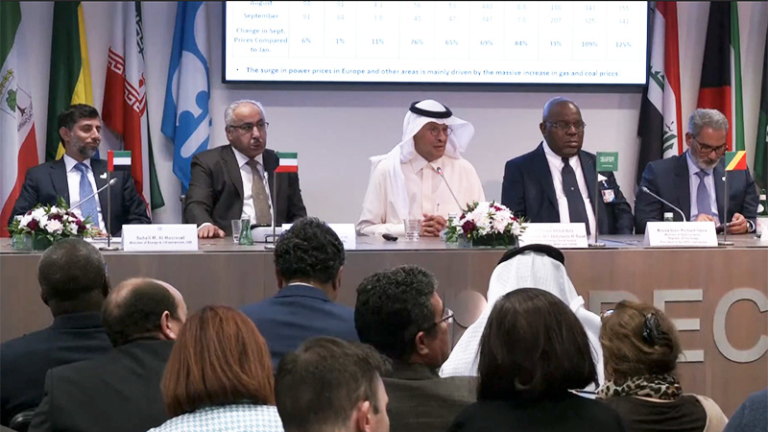
In a move that will certainly have serious political and economic repercussions in the United States and around the world, OPEC+, a group of oil-producing nations including Saudi Arabia, the United Arab Emirates, and Russia, decided to cut oil production by two million barrels per day starting in November 2022. The move comes at a time of great uncertainty and high inflation in a global economy that is currently reeling from the effects of Russia’s war on Ukraine. In the United States, the announcement served to renew a debate about the wisdom of President Joe Biden’s July 2022 visit to Saudi Arabia, which his administration presented as the right thing to do in a complicated geopolitical environment, an effort to lower gas prices at home in the US, and a response to Chinese and Russian overtures to America’s long-standing partners in the Arabian Gulf. But whatever the rationale, and despite coming recriminations about the visit, the OPEC+ decision will surely cause both political and economic pain for the Biden administration and will negatively impact the long-term US-Saudi-Emirati partnership in several ways.
First, the damage to US-Gulf relations may very well be immeasurable for Saudi Arabia and the UAE, with their desire to have a long-term security commitment from the United States most likely damaged beyond repair. Coming as it does at a moment of significant uncertainty—with collapsed negotiations over Iran’s nuclear program, as-yet inconclusive Saudi-Iranian negotiations about restoring bilateral relations, and ambiguity about the conflict in Yemen all throwing off the typical political calculus—this move opens the door to numerous unwarranted possibilities. It is already very difficult to convince many politicians in Washington—and especially Democrats—to support Gulf states that do not appear to heed the economic or strategic interests of the United States. This new development will certainly make such support even harder to come by.
Moreover, while the OPEC+ cut in oil production may negatively impact Democrats’ chances in next month’s midterms—and may potentially help Republicans in the 2024 presidential election—the die has already been cast regarding Saudi Arabia, Russia, and the UAE in American politics. Even if the midterms produce a Republican majority in one or both houses of Congress, and even if a Republican like Donald Trump returns to the White House in 2024, the well has already been poisoned when it comes to US-Saudi-Emirati relations. Actions in Congress to pass the No Oil Producing and Exporting Cartel Act and proposed legislation to withdraw US troops from Saudi Arabia and the UAE make it clear that there is bipartisan support for a negative American response to what is increasingly seen by politicians as a poor partnership that does not serve US interests. Illinois Democratic Senator Richard Durbin, who is the Chairman of the Senate’s Judiciary Committee, tweeted that “the royal Saudi family has never been a trustworthy ally of our nation. It’s time for our foreign policy to imagine a world without their alliance.”
Second, Saudi Crown Prince Mohammed bin Salman (MBS) can kiss any chance of rehabilitating his image in the United States goodbye. President Biden’s poorly-conceived trip to Saudi Arabia in July may have given MBS the hope that he would be able to sidestep the ruin of his reputation in Washington and the responsibility for having ordered the killing of Washington Post columnist Jamal Khashoggi a little over four years ago. But Saudi Arabia is currently leading the charge to reduce oil production, and the resulting rise in energy prices is sure to galvanize those who oppose offering MBS a chance to burnish his image. And in Washington, MBS may very soon be confronted by the full details of a CIA report that implicated him in Khashoggi’s murder, should someone leak the rest of the as-yet only partially declassified report.
Third, it is clear that Saudi Arabia and the UAE are in no mood to accommodate the Biden administration and its European partners in their efforts to ostracize Russia for its invasion of Ukraine. To be sure, the newly-announced cut in production will most certainly translate into higher energy prices, thereby augmenting Russia’s finances, which have been hit hard by sanctions and limits on trade. Of course, the Saudi and Emirati governments will repeat tired old mantras about “opposition to aggression” and “acquisition of land by force,” and will continue to call for a diplomatic solution to the Russian-Ukrainian crisis. But in reality, they have done nothing to help curb Russian President Vladimir Putin’s grandiose designs in Ukraine. Agreeing with Putin on cutting energy production is a fulfilment of Saudi Arabia and the UAE’s desire to help fellow authoritarians achieve their goals, no matter the consequences.
The door may indeed be slowly closing on the possibility of reviving US relations with Saudi Arabia and the UAE during the remainder of Biden’s presidency, and such a prospect is also likely to be limited if Democrats lose the White House in 2024. Looking at the US-Saudi-Emirati relationship today, the administration will be hard put to propose more military equipment and arms sales than have already been approved for these two countries. It also will be difficult for the administration to offer any assistance—no matter how inconsequential—in the war in Yemen or in preventing Houthi missile attacks on Saudi and Emirati targets. Hard politics was behind the Saudi and Emirati approval of this cut, which will cause significant pain for the United States. The same hard politics will also justify a range of American responses that will seriously harm the interests of its Gulf partners.

